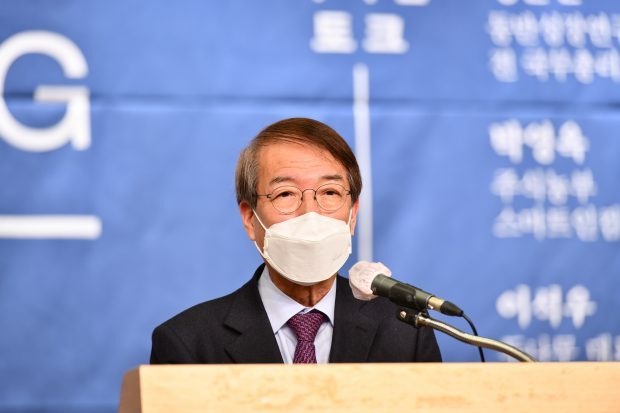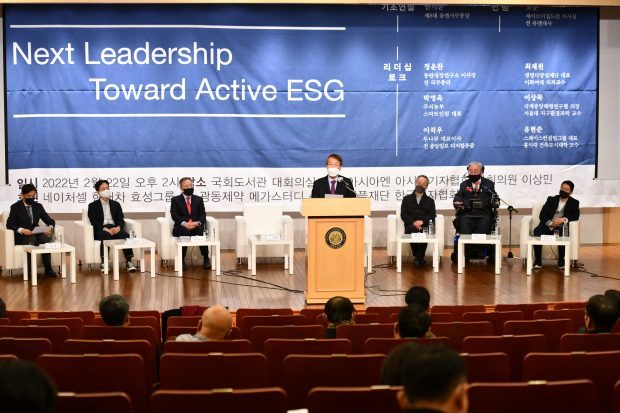
The Korean economy in crisis, shared growth, and ESG

Un-Chan Chang addressing the AsiaN forum (Photo: Kim Gil-soo)
By Un-Chan Chung,
Chairman of the Korean Institute for Shared Growth
SEOUL: I am delighted to be able to give a presentation on shared growth and ESG at AsiaN’s ESG conference today. As the first chairperson of the Korea Institute for Shared Growth in 2010, I have been working hard to solve problems caused by low growth and income polarization in our society through the shared growth model.
Currently, the Korean economy is facing difficult structural problems. Long-term growth rates are falling and income distribution is getting worse. Furthermore, nurturing creative talents in education failed, the polarization of large and small businesses, and the weakening of the spirit of community have appeared.
This means that our society is already far away from the conditions that make it possible to achieve sustainable economic growth. How can these structural problems be addressed?
I believe that “this can be resolved through efforts to institutionalize shared growth”. As part of this effort, I established the Korean Institute for Shared Growth, starting with ‘How to view the small business issue’, then the issue of the capital and the country of origin, education, inter-Korean issues, inter-regional issues, large corporations and SMEs, labor-management issues, intergenerational issues, We have held more than 80 symposiums on various topics, such as gender issues and digital innovation, to make research efforts necessary for the institutionalization of shared growth.
So, what is shared growth and how does it relate to ESG? This question is the mindset I want to share with you today.
First, I would like to talk about what mutual growth is.
Shared growth, complementation of distribution rules rather than stealing and sharing
‘Shared Growth’ is a social philosophy that ‘Let’s grow together and share together’. It aims to create a ‘partnership’ relationship between individuals, groups, and nations that make up the human community, and to operate the community in a sustainable way. To this end, win-win growth excludes ‘winner-take-all competition’ in which only one party benefits and pursues ‘cooperative competition’ in which all participants receive a fair share.
“Let’s share” in shared growth does not mean taking what belongs to those who have it and giving it to those who do not have it. Rather, it is to make the pie of the whole economy bigger, but to change the rules of distribution a little.
There is an objection that shared growth goes against capitalism. It is argued that win-win growth is the opposite of capitalism as it is to check profit maximization. But this is a misunderstanding. Shared growth does not deny profit maximization. Strictly speaking, shared growth checks the profit maximization of a winner-take-all approach. A winner-takes-all approach is not a desirable feature of capitalism.
For example, capitalism in Korea is dominated by major shareholders. We must abandon the mindset of maximizing the profits of major shareholders as the sole corporate goal. This idea is being used as a theory to justify the unfair practices of large corporations against small and medium-sized business owners. Ensuring that the performance of customers, workers, and subcontractors is reasonable is the new aspect of capitalism in Korea that should be pursued.
The concept of shared growth is very broad. It is a very broad concept, including not only shared growth between large corporations and SMEs, but also between the rich and the poor, between urban and rural areas, between regions, between metropolitan and non-metropolitan areas, between men and women, and between countries. For example, the Kaesong Industrial Complex had a symbolic meaning for mutual growth between the two Koreas, and the balanced regional selection system adopted by Seoul National University as an entrance exam system was considered for mutual growth between regions. Although FTA is not a panacea, it can be said to be an example of mutual growth between countries.
Changes in the capitalist economic order lead to deepening and polarization of economic inequality
The philosophy of shared growth is in line with Adam Smith’s 『The Theory of Moral Sentiments (1759). Adam Smith said that economic and social development in harmony and balance requires three virtues: brilliance, justice, and benevolence. The virtue of ‘Prudence’ is achieved in the market where individuals who pursue self-interest and they gather. However, the virtue of ‘justice’ and ‘beneficence’ are achieved through efforts to create a just society.
Adam Smith saw that while each one was free to engage in economic activities, the ‘Impartial Spectator’ inside the individual controlled his own unlimited freedom by allowing the individual’s economic interests only within the moral limits of society.
And he called the virtue of ‘justice’ to expand the role of a fair observer to allow the government to intervene in unfair situations such as monopoly, kiosk, and profiteering to maintain fairness. The virtue of ‘kindness’ is, for example, actively helping the underprivileged who do not have freedom to engage in economic activities.
It is only that later generations distorted Adam Smith’s claim that even if humans pursue only their own interests, the results of increasing the interests of the entire society by the invisible hand.
Smith saw ‘justice’ as the pillar of economic society and ‘kindness’ as its roof. These two virtues of Adam Smith are also pillars and roofs of shared growth. Mutual growth leans on these two factors, avoiding winner-take-all, and aims for a society of win-win cooperation.
The capitalist economic order has changed in various forms. The classical capitalism of Adam Smith’s era has changed from Keynesian capitalism, which expanded the concept of a fair individual observer to the state, to neoliberal capitalism that maximized individual free competition.
However, the global financial crisis of 2008 brought neoliberal capitalism into crisis. This is because the role of the government’s ‘fair observer’ emphasized by Adam Smith was denied and only emphasized ‘free competition of the individual’. In the name of meritocracy and meritocracy, only winner-take-all profits were pursued. The result was deepening and polarization of economic inequality.
Shared growth is the demand of the times to resolve the deepening economic inequality and polarization. Unlike neoliberalism, shared growth views each individual as a member of a community that has an interactive relationship. And set the relationship between them as a ‘partnership’ relationship. Partnership refers to a relationship in which two people live together on an equal footing with each other. Mutual growth is based on the altruistic self-interest described by J. Attali, and pursues the happiness of individuals and community members, as well as the happiness of the community, without separating the individual from society.

Now, let’s talk about shared growth and ESG. Shared growth and ESG are inextricably linked. The value pursued by ESG is shared growth, and shared growth can be realized through ESG.
As you well know, ESG stands for Environmental, Social and Governance. ESG clearly reveals the earth and the crises that we humans face, who leads our lives based on the earth, and how to solve them.
“E” is according to the severity of the climate crisis, and the key is to internalize the externality of corporate production activities and to urgently change energy. The climate crisis threatens the sustainability of the future human society and causes serious intergenerational inequality.
“S” is that companies should no longer be bound by profits but fulfill their responsibilities and roles as good citizens by pursuing social values.
As economics replaced philosophy in the discussion of social values that philosophy has been in charge of since ancient times, so-called economic values valuing profits narrowed social values. However, there are some things that are essential for human survival, even if they have little or no economic value. For example, clean air and water are the same, and so are the moral feelings emphasized by Adam Smith. Their economic value, which is not a source of profit, is little or not recognized in the market, but is absolutely essential for a healthy social community in which human life is maintained. If the value of clean water and air is only known after it disappears, then it is already too late.
If income polarization deepens and society is no longer able to survive, then it will be too late to know the value of justice and benevolence. In order to lead a sustainable life, shared value, that is, shared value, must be included in the purpose of economic activities. Instead of maximizing profits, we should pursue maximization of shared welfare. Beyond the market sentiments that there is no value if there is no profit, the moral sentiments that the market value also loses its meaning as a value if the shared value is not realized must be established.
In order to recover moral feelings, not only the efforts of natural people and corporations constituting society, but also society as a whole must promote a social contract for shared growth. A social contract promotion committee should be formed and efforts should be made for a great social compromise in accordance with deliberative democracy.
This is the gist of ESG’s argument. It is often understood that G is corporate governance, which is part of “G”. Of course, this is a very important factor, but it is not limited to the corporate level.
E·S-oriented values, a system for realizing G·E
If “E” and “S” are the values to be pursued, then “G” is the system necessary to realize “E” and “S”. Just as market failures and government failures occur due to human and institutional imperfections, building “G” as an institution to realize “E” and “S” may also require a lot of trial and error. Some companies pursuing “E” and “S” perform well, but in some cases, their CEOs are fired because of poor performance.
In addition, due to the long-standing obsession with market value and the existence of a system to justify it, conflicts with corporate activities that pursue ESG may occur. There is even a case of ESG Washing that uses ESG to hide insolvency with seemingly plausible packaging.
Although the name is ESG investment, there are cases where the investment target is not socially desirable. In the transitional situation we are currently facing, the pursuit of ESG is urgent, but rather than rushing too much, we must walk the path of maturity and perfection as an entity one by one. It’s not just a matter to be in a hurry.
Clear criteria for the practice of ESG should be established. Whether or not you truly pursue ESG can be judged by whether you respect shared values and make efforts for shared growth with partner companies. Win-win cooperation in which each company transparently discloses its externalities to partner companies and society and strives to resolve this will be the key to ESG success.
Un-Chan Chung is Korea’s leading economist. He has written ‘Principles of Economics’ and ‘Macroeconomics’, two must-read books for economics students.
He served as the 40th Prime Minister of the Republic of Korea, the 23rd President of Seoul National University, and the 22nd President of the KBO.
He is currently advocating the necessity of shared growth in our society as he is the chairman of the Win-Win Research Institute.
NOTE:
This lecture was delivered by Un-Chan Chang at the AsiaN Forum marking its tenth anniversary.
The forum, ‘Next Leadership Toward Active ESG’, feature prominent figures and experts, led by former United Nations Secretary-General Ban-Ki moon who delivered the keynote speech.
AsiaN is the media arm of the Asia Journalist Association (AJA).


